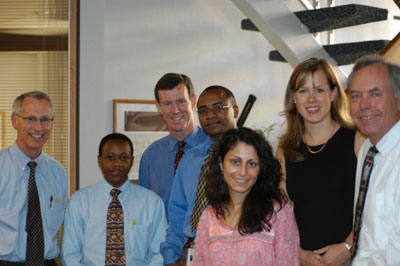International Medical Student Exchange
Students change places to learn about another country's health care Students change places to learn about another country's health care
The helping hand of the UW School of Medicine reaches out to medical training sites around the globe. Through the International Health Group, UW medical students can visit sites in Peru, Kenya, India, Ghana or the Marshall Islands.
The International Health Group's three programs are the International Health Electives program, in which fourth-year students pursue clinical rotations abroad, the International Health Opportunities Programs, in which students study abroad the summer after their first year of medical school, and the International Medical Student Exchange program.

The two Kenyan students meet with UW Medical School Dean Dr. Paul Ramsey.
The exchange program brings medical students from other countries to the UW. It aims to train the host countries' local professionals and ensure long-term benefit to the host sites. The IMSE also creates enthusiasm for foreign sites to continue providing UW School of Medicine students with excellent experiences.
The first exchange in the IMSE program was with the Nairobi, Kenya site. Henry Njuguna and James Mbuvi, both in their last year of medical school at the University of Nairobi, came to the UW for nine weeks in the fall of 2003. Njuguna and Mbuvi were selected from a pool of 30 applicants based on their academic and clinical merit.
"It was extremely competitive," said Dr. Dan Hunt, the UW medical school's former associate dean of academic affairs. "They were selected after some rigorous evaluations."
During their stay, Njuguna and Mbuvi shadowed a number of clinicians in AIDS clinics, attended seminars, many of them AIDS-related, and took classes in epidemiology.
"They're delightful young men," Hunt said. "They're highly motivated. They would come in on Saturdays and be in the library. They were very focused."
For Njuguna, the most significant thing gained from the program was realizing the importance of research in medicine because, he said, "Most up-to-date procedures and medications are used based on research findings."
"This we lack in our country," Njuguna said, "and we are forced to use outdated medicines and procedures to the detriment of our patients."
Mbuvi also found the program beneficial. In his evaluation he wrote: "It gives one the opportunity to understand how medicine is practiced elsewhere especially when one is allowed to participate fully rather than just observe."
Kenya is the only site for the exchange program so far. The program is looking to add Peru in 2005. For future candidates, Mbuvi offers this advice in his evaluation of his experience: "It is a whole new experience for anyone who chooses to come for this program. Coming here expecting to find everything different is probably what will help one cope with the experience."
"Go for it," Njuguna said. "You will learn a lot. You won't regret it."
One of reasons the IMSE program was started was to make an effort to give back to the sites abroad. "It's not really fair to send our students and not train these international students," Hunt said.
In the fall of 2002, Carolyn Hettrich, a fourth-year medical student and one of the founders of the program, approached Dr. Carey Farquhar, co-director of the International AIDS Research and Training Program, about having UW medical students go to Nairobi to work with Farquhar. She agreed with the idea but also pointed out that the UW should host Kenyan students in return.
"You need to have some sign of goodwill on both sides," Farquhar said. "It should be a bilateral exchange." Farquhar then proposed the idea to the Dean of Medicine at the University of Nairobi.
"He was very much in favor of this," Farquhar said. Once it got approval from the dean, she began working to select the Kenyan students.
Together, Hettrich and Farquhar did most of the organizing of the program. Hettrich applied for funding, which comes from Puget Sound Partners for Global Health. Farquhar and her staff set up visas and plane tickets. She also designed the Kenyan students' clinical schedules and courses. Hettrich found housing for the two Kenyan students, picked them up from the airport, gave them an orientation to the United States, and set them up with bank accounts and student ID cards.
"The staff at the International AIDS Research and Training Program directed by Dr. King Holmes were of tremendous help," Hettrich said, "as they have lots of experience in bringing foreign students to the United States."
"The exchange fosters a sense of altruism from the Kenyan physicians towards our UW students that are visiting Kenya, as they know that their students are also benefiting," Hettrich said.
Farquhar is based at Harborview Medical Center, but travels to Nairobi about three times a year for three to four weeks. Her research is in transmission of HIV from mother to child.